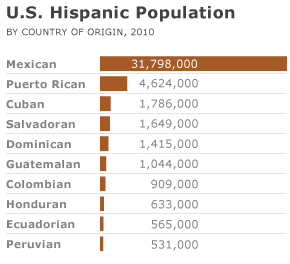31.7 Million Mexicans, Millions More Latinos In The U.S.
 The Pew Hispanic Center released an interesting report last year, finding based on 2009 and 2010 Census data that there are 31. 7 million Latinos of Mexican origin in the U.S., 4.4 million Puerto Ricans (significantly more than the 3.7 million Puerto Ricans on the island), 1.7 million Salvadorans, 1.6 million Cubans, 1.3 million Dominicans and just over a million Guatemaltecos.
The Pew Hispanic Center released an interesting report last year, finding based on 2009 and 2010 Census data that there are 31. 7 million Latinos of Mexican origin in the U.S., 4.4 million Puerto Ricans (significantly more than the 3.7 million Puerto Ricans on the island), 1.7 million Salvadorans, 1.6 million Cubans, 1.3 million Dominicans and just over a million Guatemaltecos.
Data was also available for other groups, a release from Pew about the “U.S. Hispanic Country of Origin Counts for Nation, Top 30 Metropolitan Areas” report notes:
Hispanics of Mexican, Puerto Rican, and Cuban origin or descent remain the nation’s three largest Hispanic country-of-origin groups, according to the 2010 U.S. Census. However, while the relative position of these three groups has remained unchanged since 2000, the next four Hispanic sub-groups grew faster during the decade.
Hispanics of Salvadoran origin, the fourth largest Hispanic country-of-origin group grew by 152% since 2000. The Dominican population grew by 85%, the Guatemalan population by 180% and the Colombian population by 93%. Meanwhile, the Cuban and Puerto Rican populations grow more slowly—44% and 36% respectively.
Despite their No. 1 status, Mexicans are not the dominant Hispanic origin group in many of the nation’s metropolitan areas. Among the Miami metropolitan area’s 1.5 million Hispanics, half are Cuban. In the New York-Northeastern New Jersey metropolitan area, 29.4% of Hispanics are of Puerto Rican origin and 19.7% are of Dominican origin. In the Washington, DC metropolitan area, Salvadorans are the largest group, comprising one-third of the area’s Hispanics.
However, in many metropolitan areas, Mexican origin Hispanics are by far the dominant group among Hispanics. In Chicago, nearly eight-in-ten (79.2%) of the area’s Hispanics are of Mexican origin. In the San Antonio, TX metropolitan area, Mexicans make up 91.3% of all Hispanics. And in Atlanta, GA, nearly six-in-ten (58.1%) Hispanics are of Mexican origin.
Country of origin is based on self-described family ancestry or place of birth in response to questions in the Census Bureau’s American Community Survey and on the 2010 Census form. It is not necessarily the same as place of birth, nor is it indicative of immigrant or citizenship status. For example, a U.S. citizen born in Los Angeles of Mexican immigrant parents or grandparents may (or may not) identify his or her country of origin as Mexico. Likewise, some immigrants born in Mexico may identify another country as their origin depending on the place of birth of their ancestors.
There are also specific country of origin reports available:
Follow Sara Inés Calderón on Twitter @SaraChicaD
[Image By Pew]
